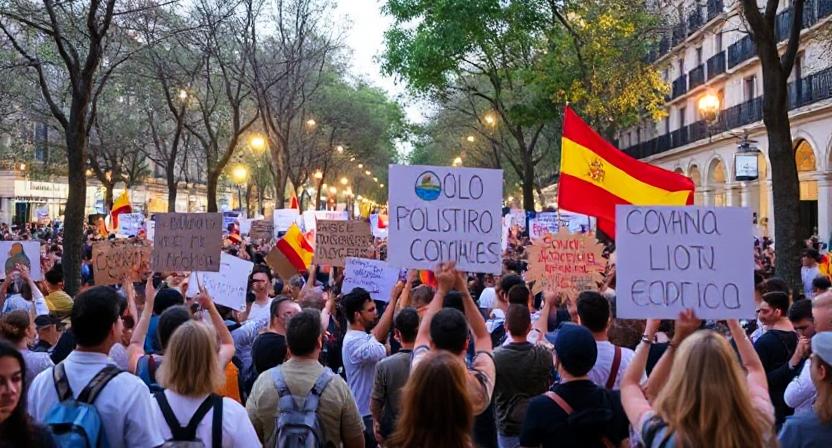Published on
September 28, 2025
In a further move against overtourism, anti-tourism protesters in Barcelona conducted a dramatic protest at Parc Güell, one of the city’s most popular monuments, on World Tourism Day. Activists, some of whom are members of the Assembly of Neighbourhoods for Tourism Degrowth, sprayed water on tourists using water pistols and chanted “tourists go home” while waving signs that said “mass tourism kills the city.” The demonstration is one of many recent indicators of mounting dissatisfaction among residents with the mounting burden of tourism on Barcelona’s infrastructure and housing supply.
The demonstration, as lighthearted in tone as it was, reflects a very real concern for the negative impacts of mass tourism. While tourism has been a stalwart of the Barcelona economy for decades, increasingly, people are aware that its uncontrolled expansion is displacing native residents and causing severe social and economic burdens.
The Link Between Over Tourism and Housing Issues
One of the main grievances voiced by the protesters is the impact of tourism on housing costs. As the number of tourist accommodations—especially short-term rentals—continues to rise, many locals are finding it increasingly difficult to afford to live in their own city. Rents have skyrocketed, and property owners are increasingly opting to rent out apartments to tourists via platforms like Airbnb, rather than offering long-term leases to local residents.
This phenomenon has contributed to a housing crisis in Barcelona, where local communities are being priced out of popular neighborhoods due to tourist-driven demand. The city’s gentrification is closely tied to tourism, as wealthy visitors push up property values, making it harder for working-class residents to afford housing. The activists argue that overcrowding, rising rents, and the loss of local character are direct consequences of uncontrolled tourism.
Tourism’s Economic Importance vs. Local Discontent
While tourism accounts for a significant portion of Barcelona’s economy, contributing to both employment and GDP, it’s clear that the economic benefits of tourism come at a cost to the city’s residents. In 2023, tourism accounted for 12.3% of Spain’s GDP, with Barcelona being one of the most lucrative destinations. The influx of tourists helps sustain businesses in the hospitality and retail sectors, as well as boost job creation in related industries.
However, the benefits of tourism growth are not always distributed equitably. Many local residents feel that tourism’s benefits are concentrated in the hands of property owners, investors, and multinational tourism companies, while they face the negative side effects, such as higher living costs and displacement. This creates tension between the economic value of tourism and the social costs imposed on residents who are being forced out of their communities.
The Call for Sustainable Tourism Practices
Amid the growing protests against overtourism, activists are calling for sustainable tourism policies that focus on long-term benefits for both tourists and locals. Sustainable tourism seeks to balance the needs of travelers with the preservation of local culture, environment, and community wellbeing. Proponents argue that tourism should not come at the expense of the local population, and there is a growing need to adopt practices that reduce the negative impact on housing and public spaces.
One solution is to regulate short-term rentals, ensuring that they do not drive up housing prices or displace local communities. Barcelona is considering policies such as limiting the number of short-term rental licenses, raising taxes on tourist apartments, and investing in affordable housing to counteract the rising costs driven by the tourism sector.
The Role of Government and Industry in Shaping Sustainable Tourism
Spain’s government is facing increasing pressure to implement policies that protect local residents while still nurturing the country’s vibrant tourism economy. The government’s proposed 21% VAT tax on short-term rentals is one such policy designed to address the increasing pressure from tourism on the housing market. This policy is aimed at curbing the proliferation of short-term rental properties, which have been a major driver of rising rents and housing shortages in cities like Barcelona.
In addition to regulatory measures, tourism operators and businesses must play a role in creating a more balanced tourism ecosystem. This includes promoting off-peak season travel, offering packages that distribute visitors to lesser-known areas, and encouraging sustainable travel practices among tourists. By shifting focus to regional tourism and embracing eco-friendly initiatives, Spain can mitigate some of the negative effects of mass tourism while still benefiting economically.
A Global Movement: Protests Against Overtourism Across Europe
The protests against overtourism in Barcelona are part of a larger movement seen across Europe, where cities like Venice, Rome, and Amsterdam are grappling with the effects of tourist overcrowding. In Venice, for example, protesters have rallied against the constant flow of visitors into the historic city, calling for more sustainable approaches to tourism that preserve local communities and avoid turning cities into tourist-only hubs.
Similar protests have occurred in other parts of Spain, including Ibiza, Malaga, and Palma de Mallorca, highlighting the need for coordinated efforts at regional and national levels to address the challenges posed by mass tourism. The demand for sustainable tourism policies has never been louder, and local governments are under increasing pressure to create solutions that balance the economic benefits of tourism with the needs of residents.
Toward a More Sustainable Tourism Model in Spain
The recent anti-tourism protests that have been taking place in Barcelona are an indicator of the increasing anxiety regarding overcrowding, housing issues, and how mass tourism affects a locality. Although tourism is an important aspect of the country’s economy, there is a pressing need for sustainable models of tourism that ensure the welfare of residents, maintain local culture’s integrity, and lighten the pressure on infrastructure.
Governments, tourist operators, and residents need to cooperate in achieving a balance in which tourism can prosper without residents losing their high standard of living. As protests escalate, one can see that there needs to be sustainable tourism practices adopted to safeguard the future of cities such as Barcelona so that tourism can continue to be an advantage and not a burden.
